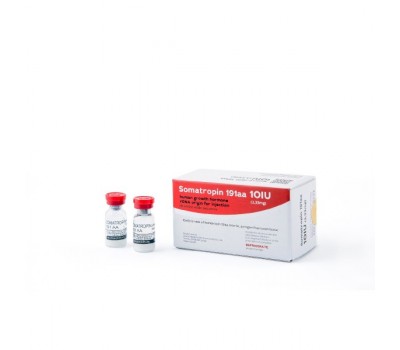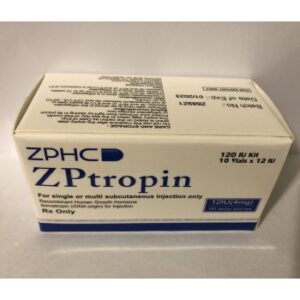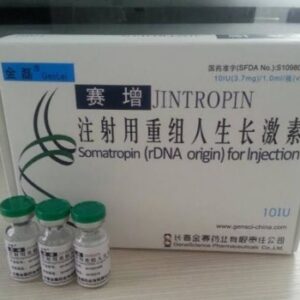Somatropin (HGH) 10 vials 10 IU/vial
Human growth hormone (somatropin) is a protein that is manufactured to be nearly identical to the main form of the naturally occurring human growth hormone.
$300.00 $350.00
Human Growth Hormone
Human growth hormone is perhaps one of the newest compounds used by athletes and bodybuilders seeking to gain a broader advantage in the area of physique and performance improvement. It must first be clear that human growth hormone is not an anabolic steroid.
Human growth hormone is what is known as a protein hormone (or a peptide hormone) that is produced naturally and endogenously by the human body and is secreted in the pituitary gland.
Read here: What Are Cannabinoids and What Do They Do?
The neurosecretory cells of the hypothalamus release a hormone known as GHRH (growth hormone-releasing hormone, also known as somatocrinin) and another hormone known as GHIH (growth hormone inhibitor hormone) in the pituitary gland, which it then makes and releases your storage of human growth hormone in the blood.
Human growth hormone belongs to the family of protein hormones Somatotropin, which makes it very close to the hormone prolactin, which also belongs to the family of hormones Somatotropin.
The total family of somatotropins includes CSH1, CSH2, CSHL1, HGH (human growth hormone), PRL (prolactin), and hGH-V. Human growth hormone consists of a structure of 191 amino acids.
Human growth hormone, as its name suggests, is an essential hormone in the role of many different growth mechanisms and functions in the human body.
However, the activity of human growth hormone is not limited to this function but has a large number of different services and effects on many different processes of the body, including the regulation of certain aspects of metabolism, regeneration and growth cellular, as well as healing. And repair, and more.
Many of the functions of the Human Growth Hormone are well known, but they also have properties and services that are not yet known or that are not well understood.
The primary effects of the Human Growth Hormone on the body’s growth functions are found in three main areas: bone growth, skeletal muscle growth, growth of the internal organs and healing/growth/ repair of the connective tissue, such as tendons, ligaments, and joints.
In terms of its effects on metabolism, it supports the efficient functions of proteins, carbohydrates, fats, and the metabolism of vitamins/minerals.
Within medicine, human growth hormone has been used successfully as a treatment for many different types of disorders and ailments. The first and most important use of HGH medically is for the treatment of dwarfism with pituitary deficiency, a condition in which individuals do not grow adequately due to the lack of endogenous production of human growth hormone.
This is most common during childhood or adolescence, where synthetic human growth hormone is administered to increase growth as much as possible before the middle stages of youth, so the growth potential becomes increasingly limited. It is also used for similar conditions in adults as well.
Medically, human growth hormone is also used for the treatment of adults with human growth hormone deficiency, where adults produce insufficient levels of GH, and synthetic exogenous human growth hormone is administered to restore levels in the range normal (preferably in the field of what a young adult possessed to regain youth and show anti-aging effects so commonly attributed to human growth hormone).
Finally, exogenous human growth hormone therapy is used in the treatment of muscle wasting related to AIDS / HIV (or as a result of many other diseases). There are other conditions in which human growth hormone is occasionally used for treatment, such as the promotion of accelerated healing in burn victims.
Controversy About the Effectiveness of the Human Growth Hormone
A hotly debated issue is whether or not the Human Growth Hormone is really useful in terms of improving physique and performance, and if indeed it is an effort and a worthwhile investment for those seeking to enhance their physical performance and / or sports While this will be discussed later in the section on doses and cycles of human GH of this profile, the truth of the matter is that several studies have shown that the use of human growth hormone results in a pleasant weight gain and Increased lean mass, is a wrong choice to gain strength.
In addition, it has been shown that human growth hormone used alone (without anabolic steroids stacked with it) will typically only result in dramatic fat loss, and that to experience the spectacular gains in muscle mass, one should use human growth hormone with anabolics Steroids or human growth hormone should be used long-term (at least 6 months of constant use).
Studies in patients with AIDS / HIV who are administered human growth hormone have shown that the anabolic effects are significant in these individuals.
However, the context should be considered here, since studies conducted in healthy adults will result in results different from studies undertaken in fragile patients with HIV / AIDS. After its first growth in popularity during the 1980s, a large number of misconceptions, myths, and rumors persisted about its properties and its use, where it was initially thought to be the most anabolic compound available.
With an ever better understanding of human growth hormone compared to that of 30 years ago and all the clinical studies that have been done, we have a better understanding of it and that the earlier myths of the 1980s were not exactly right.
As a result, Growth Hormone today is mainly used for its dramatic fat loss effects, which manifest themselves immediately after first use. Anabolic effects on muscle tissue, as indicated above, require at least six months of constant use (due to the slow and continuous accumulation of HGH and IGF-1 in the body) before they can be experienced.
Therefore, the general conclusion when it comes to human growth hormone is that it is considered a much weaker substance to improve performance and physique than anabolic steroids, and should be used in a particular way to get muscle growth and the strength gains of that.
Essentially, human growth hormone is a compound that should only be used by advanced athletes and bodybuilders and is considered a useless compound for beginners.
This is because the majority of advanced anabolic steroid users have advanced so much in their progress and training that they have reached more or less a “dead end” for their development, regardless of the effort or the compounds used. Commonly, this is because the individual has reached their genetic potential.
GH can help a person overcome this “dead end” and, therefore, this is the reason why Growth Hormone should be considered an advanced compound in the arsenal of any highly advanced or experienced athlete.
| Dosage | 10 IU/vial |
| Total amount | 10 vials/box |
| Component | Human Growth Hormone 191 Amino Acid |




There are no reviews yet.